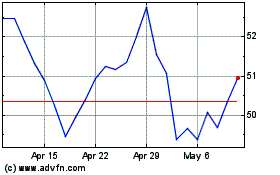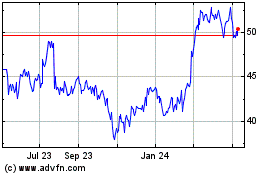Google Accuses EU of Antitrust About Face
November 02 2015 - 1:40PM
Dow Jones News
BRUSSELS—Google owner Alphabet Inc. accused European Union
regulators of making an unexplained about-face in their decision to
file antitrust charges against the U.S. search giant, and warned
that there was "no basis" for imposing fines, according to a
redacted copy of Google's response seen by The Wall Street
Journal.
The response, which runs to almost 130 pages and leans heavily
on legal opinions and case law, suggests that Google is gearing up
for a protracted legal battle against the charges brought by the
European Commission.
"The theory on which the [EU's] preliminary conclusions rest is
so ambiguous that the Commission itself concluded three times that
the concern had been resolved," Google's lawyers wrote in the
document. The document was recently sent to complainants in the
case following heavy editing to remove commercially sensitive
material.
The EU's demands, Google argues, amount "to a demand that we
sacrifice quality to subsidize competitors."
EU regulators in April became the first globally to file formal
antitrust charges against Google, accusing the search giant of
skewing search results to favor its own comparison-shopping
service. The move followed a five-year investigation during which
the EU sought, and failed, three times to settle with Google.
The EU warned that Google could face substantial fines and
called on the company to use the "same underlying processes and
methods" when presenting rival comparison-shopping services on its
search page, according to people who have seen the EU's charge
sheet. Fines could theoretically amount to 10% of the company's
revenue, which in 2014 amounted to $66 billion.
In its response, Google rebuffed those demands and claimed that
the EU had no basis to impose fines.
"The Commission itself previously found that a requirement that
Google should apply the same algorithm to rank all search results
including its own would not be indispensable to remedy the
competition concerns," the document says, citing a note sent by the
EU's former antitrust chief Joaquí n Almunia to his fellow
commissioners.
The document highlights Mr. Almunia's announcement in January
2014 that a third settlement proposal from Google was "capable of
addressing [the EU's] competition concerns," as well as the EU's
decision to send letters to complainants later that year to reject
their concerns about the settlement.
The EU changed tack in September 2014, warning Google that its
proposed settlement wasn't sufficient and the company must offer
more.
"If the Commission decides to end the commitment process it must
therefore provide reasons for the change in position," the document
says. It argues that the EU "has not provided substantiated reasons
as to why it found the January 2014 commitments insufficient."
Google also questions the EU's legal justification for demanding
that Google change its algorithms to treat comparison-shopping
rivals equally in search results. To do so, Google argues, the EU
would need to show that its results are as essential as a public
utility.
"The only legal framework that could apply here for a finding of
abuse is the framework for a duty to supply," the document says.
"But the [charge sheet] does not (and cannot) establish the legal
conditions for such a duty."
The EU shouldn't impose a fine, the document argues, because the
case rests on a novel legal theory, and Google participated in
settlement negotiations in good faith.
"There is no precedent for characterizing Google's conduct as an
illegal abuse," the document says. "The rules must be knowable in
advance."
The document expands on Google's earlier arguments that the EU
erred in its analysis of the fast-changing online-shopping business
and failed to account for the fast growth of companies like
Amazon.com Inc. and eBay Inc.
"Users have a huge—and expanding—array of options when searching
for products," the document says. "The [EU's charge sheet] misses
hundreds of other aggregators and ignores the remarkable success of
merchant platforms like Amazon and eBay."
It cites a legal opinion from Professor Carl Shapiro, a former
senior economist in the Justice Department's antitrust division,
that "merchant platforms are a powerful competitive threat to
aggregation only comparison shopping sites."
It could be another year or more until the EU makes a decision
in the case, and that could be challenged in the EU's appeals
courts in Brussels, a process that could take more than five
years.
A Google spokesman declined to comment.
Write to Tom Fairless at tom.fairless@wsj.com and Natalia
Drozdiak at natalia.drozdiak@wsj.com
Subscribe to WSJ: http://online.wsj.com?mod=djnwires
(END) Dow Jones Newswires
November 02, 2015 13:25 ET (18:25 GMT)
Copyright (c) 2015 Dow Jones & Company, Inc.
eBay (NASDAQ:EBAY)
Historical Stock Chart
From Mar 2024 to Apr 2024

eBay (NASDAQ:EBAY)
Historical Stock Chart
From Apr 2023 to Apr 2024
